2021-2022学年仁爱版英语八年级下册 副词专项讲解 课件(共14张PPT)
文档属性
| 名称 | 2021-2022学年仁爱版英语八年级下册 副词专项讲解 课件(共14张PPT) |  | |
| 格式 | zip | ||
| 文件大小 | 6.8MB | ||
| 资源类型 | 教案 | ||
| 版本资源 | 仁爱科普版 | ||
| 科目 | 英语 | ||
| 更新时间 | 2022-07-28 11:22:15 | ||
图片预览

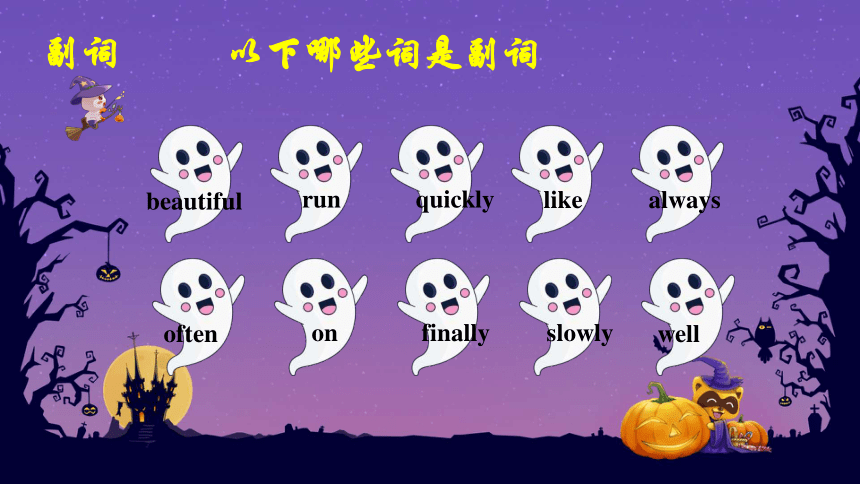
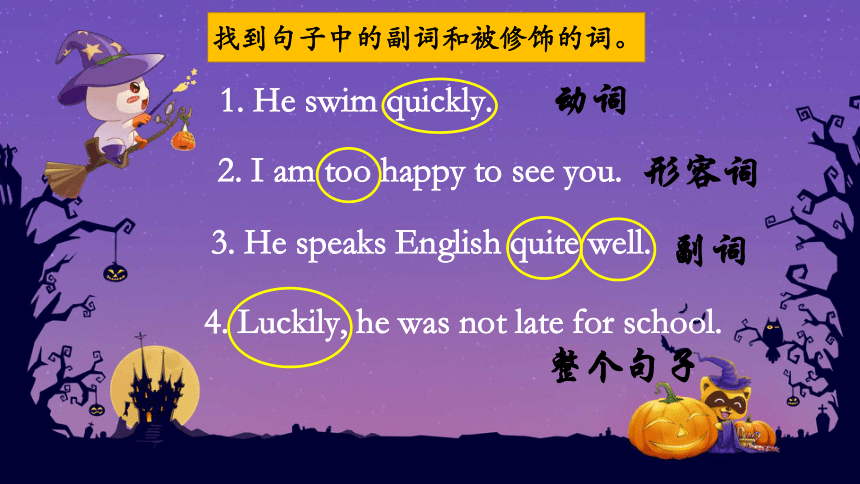
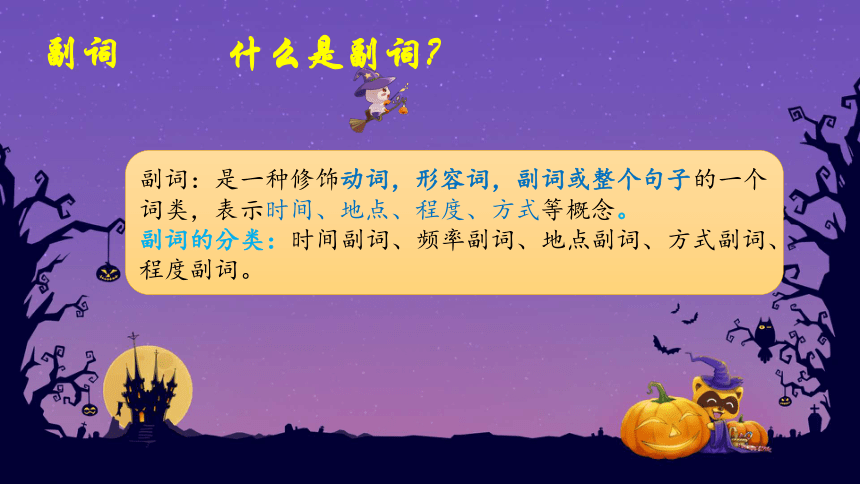
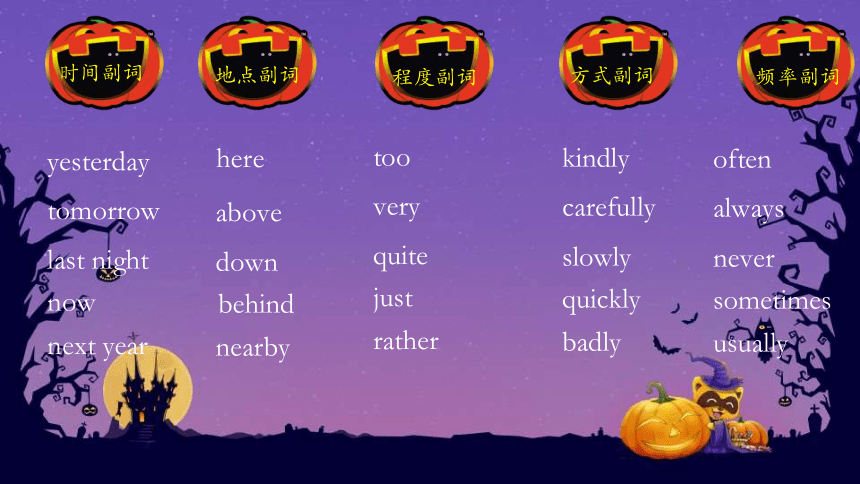
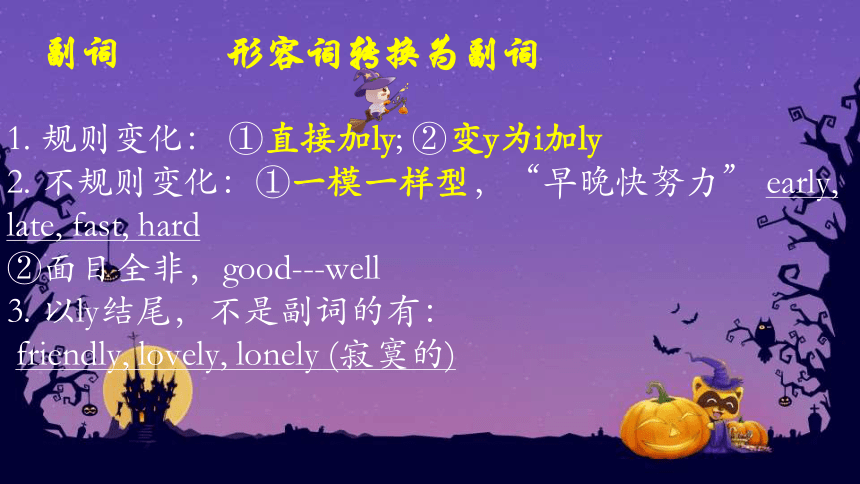
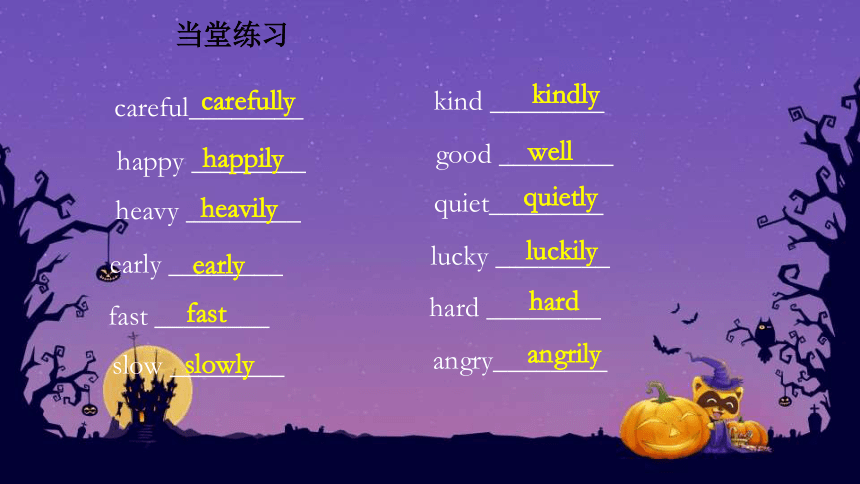
文档简介
(共14张PPT)
副词
副词
以下哪些词是副词
beautiful
run
quickly
like
always
often
on
finally
slowly
well
1. He swim quickly.
2. I am too happy to see you.
3. He speaks English quite well.
4. Luckily, he was not late for school.
找到句子中的副词和被修饰的词。
动词
形容词
副词
整个句子
副词
什么是副词?
副词:是一种修饰动词,形容词,副词或整个句子的一个词类,表示时间、地点、程度、方式等概念。
副词的分类:时间副词、频率副词、地点副词、方式副词、程度副词。
时间副词
地点副词
程度副词
方式副词
频率副词
yesterday
tomorrow
last night
now
next year
too
very
quite
just
rather
above
down
behind
nearby
here
kindly
carefully
slowly
quickly
badly
often
always
never
sometimes
usually
副词
形容词转换为副词
1. 规则变化: ①直接加ly; ②变y为i加ly
2. 不规则变化:①一模一样型,“早晚快努力” early, late, fast, hard
②面目全非,good---well
3. 以ly结尾,不是副词的有:
friendly, lovely, lonely (寂寞的)
当堂练习
careful________
kind ________
happy ________
good ________
heavy ________
quiet________
early ________
lucky ________
fast ________
hard ________
slow ________
angry________
carefully
kindly
happily
well
heavily
quietly
early
luckily
fast
hard
slowly
angrily
副词
副词的用法—修饰动词
1. He speaks English badly.
2. He shouted loudly.
3.He drives the car quickly.
副词
副词的用法—修饰动词
1.The bus went _____ (slow)yesterday afternoon.
2.He wrote very ______ (好).
3.The wind is blowing _______ (strong).
slowly
well
strongly
副词
副词的用法—修饰形容词
1. It was too hot yesterday.
2. The dress is quite big for you.
副词
副词的用法—修饰副词
1. He works very hard.
2. He speaks English quite well.
副词
副词的用法—修饰形容词
1.The bus went _____ (slow)yesterday afternoon.
2.He wrote very ______ (好).
3.The wind is blowing _______ (strong).
slowly
well
strongly
副词
副词的用法—修饰整个句子
1. Generally ,people take the train into London.
2. Luckily, my father lives in a safe place.
Meimei walks as ___________ (慢) as Lily does.
It is raining ___________ (heavy).
The man took off his shoes and put them under his bed _____ (quiet).
It snowed ___________ (heavy) last night and now the streets are covered with snow.
She didn’t do her homework _____________(仔细).
The meat is very___________ (good), and it sells ___________ (good)
slowly
heavily
quietly
heavily
carefully
good
well
副词
副词
以下哪些词是副词
beautiful
run
quickly
like
always
often
on
finally
slowly
well
1. He swim quickly.
2. I am too happy to see you.
3. He speaks English quite well.
4. Luckily, he was not late for school.
找到句子中的副词和被修饰的词。
动词
形容词
副词
整个句子
副词
什么是副词?
副词:是一种修饰动词,形容词,副词或整个句子的一个词类,表示时间、地点、程度、方式等概念。
副词的分类:时间副词、频率副词、地点副词、方式副词、程度副词。
时间副词
地点副词
程度副词
方式副词
频率副词
yesterday
tomorrow
last night
now
next year
too
very
quite
just
rather
above
down
behind
nearby
here
kindly
carefully
slowly
quickly
badly
often
always
never
sometimes
usually
副词
形容词转换为副词
1. 规则变化: ①直接加ly; ②变y为i加ly
2. 不规则变化:①一模一样型,“早晚快努力” early, late, fast, hard
②面目全非,good---well
3. 以ly结尾,不是副词的有:
friendly, lovely, lonely (寂寞的)
当堂练习
careful________
kind ________
happy ________
good ________
heavy ________
quiet________
early ________
lucky ________
fast ________
hard ________
slow ________
angry________
carefully
kindly
happily
well
heavily
quietly
early
luckily
fast
hard
slowly
angrily
副词
副词的用法—修饰动词
1. He speaks English badly.
2. He shouted loudly.
3.He drives the car quickly.
副词
副词的用法—修饰动词
1.The bus went _____ (slow)yesterday afternoon.
2.He wrote very ______ (好).
3.The wind is blowing _______ (strong).
slowly
well
strongly
副词
副词的用法—修饰形容词
1. It was too hot yesterday.
2. The dress is quite big for you.
副词
副词的用法—修饰副词
1. He works very hard.
2. He speaks English quite well.
副词
副词的用法—修饰形容词
1.The bus went _____ (slow)yesterday afternoon.
2.He wrote very ______ (好).
3.The wind is blowing _______ (strong).
slowly
well
strongly
副词
副词的用法—修饰整个句子
1. Generally ,people take the train into London.
2. Luckily, my father lives in a safe place.
Meimei walks as ___________ (慢) as Lily does.
It is raining ___________ (heavy).
The man took off his shoes and put them under his bed _____ (quiet).
It snowed ___________ (heavy) last night and now the streets are covered with snow.
She didn’t do her homework _____________(仔细).
The meat is very___________ (good), and it sells ___________ (good)
slowly
heavily
quietly
heavily
carefully
good
well
同课章节目录
- Unit 5 Feeling excited
- Topic 1 You look excited
- Topic 2 I’m feeling better now.
- Topic 3 Many things can affect our feelings.
- Unit 6 Enjoying Cycling
- Topic 1 We're going on a three-day visit to Mount
- Topic 2 How about exploring Tian’anmen Square?
- Topic 3 Bicycle riding is good exercise.
- Unit 7 Food festival
- Topic 1 We’re preparing for a food festival.
- Topic 2 I’m not sure whether I can cook it well.
- Topic 3 I Cooked the Most Successfully
- Unit 8 Our Clothes
- Topic 1 We will have a class fashion show.
- Topic 2 We can design our own uniforms.
- Topic 3 He said the fashion show was wonderful.
